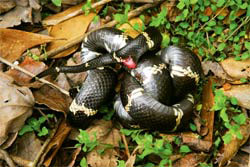Sexing snakes by probing makes me nervous. Is there another way to determine snake sex?
Q. Sexing snakes by probing still makes me nervous. I bought a set of probes to check my colubrids, but I don’t feel comfortable with the idea at all. Isn’t it easy to injure them if I push it too hard? Can you explain how hard to push in a probe, so I don’t puncture the end on either a male or female? This doesn’t seem like something that anyone except an experienced breeder or veterinarian should attempt.
-Jonas Pidgeon, Colorado
A. Sliding a slender, round-ended rod into a snake’s cloaca to determine the sex, or “probing,” is a technique that’s been around since at least the 1970s. People eager to know their animals’ correct sex for breeding discovered the method, not veterinarians or doctors.
Basically probing is meant to find one of the hemipenes. Keepers insert the blunt rod inside the organ while it’s at rest in a male’s tail base. If the probe enters and descends toward the tail tip more than two or three subcaudal scale widths behind the cloaca, it has entered one of the hemipenes’ prongs. On most adult colubrids 3 to 5 feet long, each side is roughly 1½ to 3 or more inches deep.

Bill Love
Kingsnakes (Lampropeltis getula) sometimes squirt blood from the cloaca during probing. Don’t let this unsettling habit fool you into believing you’ve hurt it with gentle probing
Females don’t have these structures, but most have tiny scent gland pockets in their tail bases instead. They’re never anywhere close to being as deep as the male organs. If the probe only goes in a half-inch or less, it’s a female.
By emulating their mentors and through trial and error, herpetoculturists have taught themselves how to probe herps over the decades. Having an experienced person demonstrate is the preferred method of instruction. In lieu of that, I’ll have to think about how to describe the proper pressure to exert in words.
Try these analogies: Imagine using the eraser end of a pencil to push through some toilet paper squares. Two or three layers of the paper approximate the resistance offered by a 4-foot-long male rat snake, kingsnake or boa initially being probed. Finding the openings and inserting the probe inside a pocket is the toughest part of the process. Many people are squeamish about doing the procedure for fear of hurting this presumably delicate region of a snake. After probing thousands of snakes, I’ve never gotten the impression that this area is especially delicate.
Once you find the pocket (hemipenes or scent glad) and the probe slips inside, virtually no pressure is required to advance it to the end. As you try to “hit bottom,” the pressure isn’t any greater than you’d use to squish a mosquito with your fingertip using the minimum effort necessary. Don’t press any harder, and you’ll do fine.
When you hit bottom, the probe should bump against an obvious end with a dull, imaginary “thud.” Each prong of the hemipenes is somewhat elastic, so there’s room for a probe to stretch the organ and bounce back a little. Each hemipenis is turned completely inside out when used, so a certain amount of flexibility is essential.
Thinking about this anthropomorphically, you’ll probably faint first and never succeed, but it’s really not that difficult if you approach it with determination. For all the joking I’ve heard about “turning a female into a male” (pushing a probe in too far and breaking through a female’s scent gland to the length of what might be expected for a male’s hemipenis), I’ve never met someone who thinks it actually happened to them.
Contact your nearest herp society, shop, breeder or zoo, and ask if anyone can give you a personal demonstration. You also can see the procedure performed on a corn snake. My wife’s website, www.cornutopia.com, offers a video demo under the Sexing Videos link on her home page.


